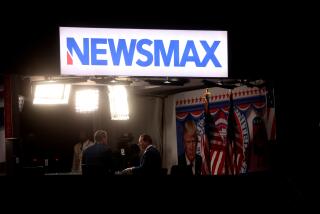TV Election Gaffes Called Statistical, Not Political
- Share via
NEW YORK — Political bias was not at work in the mistakes network news officials made on election night and will not be the focus of next week’s hearings into the disastrous election coverage, Rep. W.J. “Billy” Tauzin (R-La.) said Thursday.
But Tauzin, who called the hearings for Wednesday to look into what went wrong on election night Nov. 7, said at a news conference in Washington that significant questions remain about the role statistical bias played when networks and cable channels mistakenly called a victory in Florida for Vice President Al Gore and then later prematurely gave the state to Texas Gov. George W. Bush.
“After carefully reviewing all of the networks’ internal reports as well as our own investigators’ report, there is no evidence of intentional bias in the gaffes made by the networks on election night,” said Ken Johnson, a spokesman for Tauzin.
However, Johnson said, their analysis of the night has revealed “serious statistical errors” and a system for projecting races that hasn’t been updated in 30 years. That system, they believe, skewed data to favor Democrats, in part because largely Republican absentee ballots were underrepresented.
Tauzin’s office released a Fox News Channel internal report Thursday on what went wrong on election night, while ABC News released the results of its own investigation. Like other networks before them, both ABC and Fox concluded the problems were largely due to bad information supplied by Voter News Service, an exit poll consortium run by television networks and Associated Press.
Fox said it “takes full responsibility” for the wrong call for Gore in Florida, noting that, while it was based on bad VNS data, Fox “should have overridden the bad data.”
ABC’s report detailed numerous VNS problems, from the use of atypical precincts as the basis for vote projections to incorrect estimates of the absentee vote. A VNS-commissioned investigation has made similar findings.
ABC and Fox said their investigations found no “intentional” political bias in the timing of state vote projections. ABC said that “the timing of each of these projections is fully explainable by the data available at various times of the night,” although historical comparisons of exit poll data and actual returns “have been shown to favor Democratic candidates somewhat more than Republicans.” Fox said that “statistical bias may be present in the VNS models.”
Fox, criticized because its state projections were made by John Ellis, a Bush cousin, said its investigation showed Ellis conducted himself professionally. Fox went on to note that the other three members of its “decision desk” had Democratic leanings.
Despite Tauzin’s remarks, next week’s hearings are still likely to be heated, with Democratic and Republican lawmakers letting off steam about a night whose mishaps both sides feel did harm to their candidates. Executives from the networks and VNS are expected to attend.
Aides to Tauzin said good has already come of the decision to hold the hearings, with all networks agreeing that changes are needed and pledging not to call the outcome in a state before its polls have closed.
Both ABC and Fox reiterated that they favor a uniform poll closing time. Fox said it will insist that all VNS models be reexamined from scratch and overhauled.
ABC recommended that the accuracy and reliability of VNS data be improved, or that, if VNS doesn’t make changes, that ABC be more conservative in its projections. ABC said it believes that, with improvements, VNS remains a “highly reliable means for analyzing and reporting election results.”
*
Jensen reported from New York, Garvey from Washington.
More to Read
The biggest entertainment stories
Get our big stories about Hollywood, film, television, music, arts, culture and more right in your inbox as soon as they publish.
You may occasionally receive promotional content from the Los Angeles Times.











